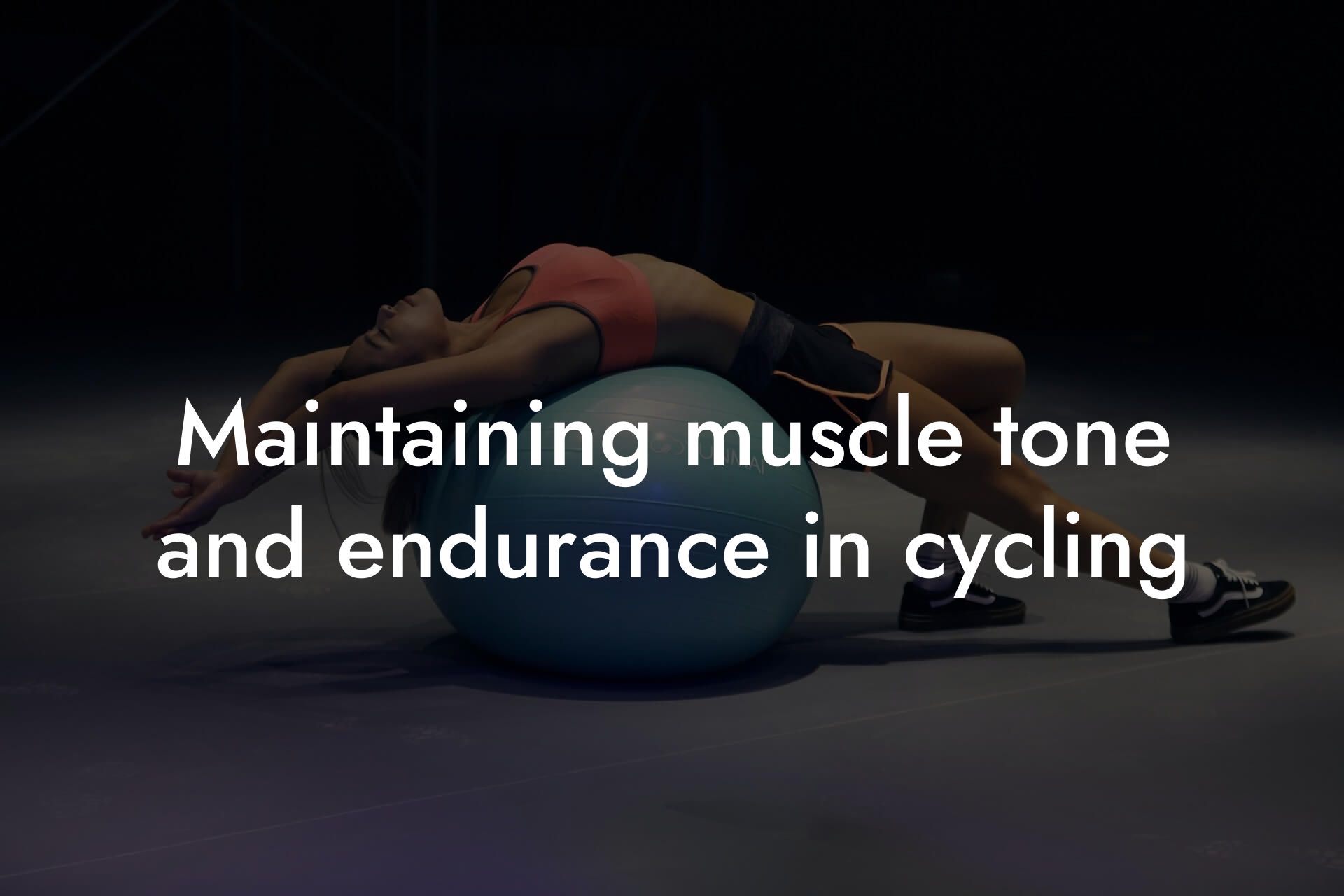As high-earning professionals, taking care of your physical appearance and overall health is crucial for maintaining peak performance in both your personal and professional life. One of the most effective ways to do so is by incorporating cycling into your fitness routine. Cycling is a low-impact exercise that offers numerous benefits for cardiovascular health, making it an excellent addition to your workout regimen.
Table of Contents
- What is Cardiovascular Health?
- Benefits of Cycling for Cardiovascular Health
- How Cycling Affects Cardiovascular Risk Factors
- The Science Behind Cycling and Cardiovascular Health
- How to Incorporate Cycling into Your Fitness Routine
- Get a Comprehensive Body Assessment with Tano Performance Group
- Frequently Asked Questions
What is Cardiovascular Health?
Before we dive into the role of cycling in cardiovascular health, it's essential to understand what cardiovascular health entails. Cardiovascular health refers to the overall health of your heart, blood vessels, and circulatory system. A healthy cardiovascular system enables your heart to pump blood efficiently, supplying oxygen and nutrients to your body's tissues and organs. Maintaining good cardiovascular health reduces the risk of developing cardiovascular diseases, such as heart attacks, strokes, and high blood pressure.
Benefits of Cycling for Cardiovascular Health
Cycling is an excellent cardiovascular exercise that offers numerous benefits for your heart health. Some of the most significant advantages of cycling for cardiovascular health include:
• Improved Cardiovascular Function: Regular cycling helps strengthen your heart, allowing it to pump blood more efficiently. This, in turn, improves cardiovascular function, reducing the risk of heart disease.
• Increased Aerobic Capacity: Cycling increases your aerobic capacity, enabling your body to utilize oxygen more efficiently. This enhances your endurance and overall physical fitness.
• Enhanced Blood Flow: Cycling helps improve blood flow and circulation, which increases oxygen delivery to your muscles and organs.
• Reduced Blood Pressure: Regular cycling has been shown to lower blood pressure and reduce the risk of hypertension.
• Improved Lipid Profiles: Cycling helps increase high-density lipoprotein (HDL) cholesterol, the "good" cholesterol, while reducing low-density lipoprotein (LDL) cholesterol, the "bad" cholesterol.
How Cycling Affects Cardiovascular Risk Factors
Cycling has a significant impact on various cardiovascular risk factors, including:
• Body Fat Percentage: Cycling helps reduce body fat percentage, which is a significant risk factor for cardiovascular disease.
• Blood Sugar Control: Regular cycling improves insulin sensitivity, reducing the risk of developing type 2 diabetes.
• Stress Reduction: Cycling is an excellent stress-reducing activity, which helps lower cortisol levels and improve overall cardiovascular health.
The Science Behind Cycling and Cardiovascular Health
Studies have consistently shown that regular cycling has a positive impact on cardiovascular health. A study published in the Journal of the American Heart Association found that regular cycling reduced the risk of heart disease by 35% in middle-aged men. Another study published in the European Journal of Preventive Cardiology found that cycling improved cardiovascular function in patients with heart failure.
How to Incorporate Cycling into Your Fitness Routine
Incorporating cycling into your fitness routine is easier than you think. Here are some tips to get you started:
• Start with Short Rides: Begin with short rides of 20-30 minutes and gradually increase your duration and intensity.
• Invest in a Good Bike: Invest in a comfortable and well-fitting bike that suits your riding style.
• Find a Cycling Buddy: Cycling with a friend or family member can help keep you motivated and accountable.
• Track Your Progress: Use a fitness tracker or cycling app to track your progress, set goals, and monitor your performance.
In conclusion, cycling is an excellent way to improve cardiovascular health, reducing the risk of heart disease, strokes, and high blood pressure. By incorporating cycling into your fitness routine, you can improve cardiovascular function, increase aerobic capacity, and enhance overall physical fitness. As high-earning professionals, taking care of your cardiovascular health is crucial for maintaining peak performance in both your personal and professional life. At Tano Performance Group, we understand the importance of physical fitness and offer comprehensive body assessments using our state-of-the-art DEXA machine. Take the first step towards achieving your fitness goals and schedule a consultation with us today.
Get a Comprehensive Body Assessment with Tano Performance Group
At Tano Performance Group, we offer comprehensive body assessments using our state-of-the-art DEXA machine. Our assessments provide a detailed analysis of your body composition, including body fat percentage, bone density, and muscle mass. With this information, you can create a personalized fitness plan tailored to your specific needs and goals. Schedule a consultation with us today and take the first step towards achieving optimal physical fitness and cardiovascular health.
Frequently Asked Questions
What is the impact of cycling on cardiovascular health?
Cycling has a profound impact on cardiovascular health, improving heart function, reducing blood pressure, and increasing circulation. Regular cycling can also lower the risk of heart disease, stroke, and high blood pressure.
How does cycling improve cardiovascular health?
Cycling improves cardiovascular health by strengthening the heart, increasing blood flow, and enhancing the body's ability to transport oxygen and nutrients. This, in turn, reduces the risk of cardiovascular disease and improves overall health.
What are the benefits of cycling for cardiovascular health?
The benefits of cycling for cardiovascular health include improved heart function, increased aerobic capacity, enhanced circulation, and reduced blood pressure. Cycling also reduces the risk of heart disease, stroke, and high blood pressure.
Can cycling help with weight loss?
Yes, cycling can be an effective way to lose weight and improve body composition. Cycling burns calories, builds muscle, and increases metabolism, making it an excellent addition to a weight loss program.
How often should I cycle to see improvements in cardiovascular health?
To see improvements in cardiovascular health, it's recommended to cycle at least 3-4 times per week, with a minimum of 30 minutes per session. However, the frequency and duration of cycling can vary depending on individual goals and fitness levels.
What is the best type of cycling for cardiovascular health?
The best type of cycling for cardiovascular health is high-intensity interval training (HIIT). HIIT involves short bursts of high-intensity cycling followed by periods of rest. This type of cycling is effective for improving cardiovascular health and burning calories.
Can cycling be done indoors?
Yes, cycling can be done indoors using a stationary bike or spin bike. Indoor cycling is a great option for those who prefer to cycle in a controlled environment or during inclement weather.
What safety precautions should I take when cycling?
When cycling, it's essential to wear a properly fitting helmet, follow traffic laws, and be aware of your surroundings. Additionally, cyclists should wear bright and reflective clothing, especially in low-light conditions.
Can cycling be done at any age?
Yes, cycling can be done at any age. Cycling is a low-impact activity that can be adapted to suit individual fitness levels and abilities. Many people cycle well into their 70s and 80s, and it's an excellent way to stay active and healthy throughout life.
How does cycling compare to other forms of exercise for cardiovascular health?
Cycling is an excellent form of exercise for cardiovascular health, comparable to running, swimming, and brisk walking. Cycling is low-impact, making it easier on the joints compared to high-impact activities like running.
Can cycling help with stress relief?
Yes, cycling can be an effective way to relieve stress and anxiety. The physical activity and fresh air can help reduce stress levels, improve mood, and promote relaxation.
How does cycling affect bone density?
Cycling can help improve bone density, particularly in the hips, legs, and spine. This is especially important for older adults and those at risk of osteoporosis.
Can cycling be done with a physical disability?
Yes, cycling can be adapted for individuals with physical disabilities. There are various types of adaptive cycles and equipment available, making it possible for people with disabilities to enjoy the benefits of cycling.
How does cycling affect sleep?
Regular cycling can help improve sleep quality and duration. Cycling can also increase the body's production of melatonin, a hormone that regulates sleep-wake cycles.
Can cycling be done with a medical condition?
It's essential to consult with a healthcare professional before starting a cycling program, especially if you have a medical condition. They can provide guidance on safe exercise practices and any necessary modifications.
How does cycling affect mental health?
Cycling can have a positive impact on mental health, reducing symptoms of anxiety and depression. The physical activity and sense of accomplishment can boost self-esteem and overall well-being.
Can cycling be a social activity?
Yes, cycling can be a social activity. Joining a cycling group or club can provide opportunities to meet new people, make friends, and stay motivated.
How does cycling affect digestion?
Regular cycling can improve digestion and reduce symptoms of irritable bowel syndrome (IBS). Cycling can also increase the body's production of gut-friendly hormones.
Can cycling be done during pregnancy?
Yes, cycling can be done during pregnancy, but it's essential to consult with a healthcare professional first. They can provide guidance on safe exercise practices and any necessary modifications.
How does cycling affect immune function?
Regular cycling can boost immune function, reducing the risk of illness and infection. Cycling can also increase the body's production of antioxidants, which help protect against oxidative stress.
Can cycling be done with a busy schedule?
Yes, cycling can be adapted to fit even the busiest of schedules. Short, high-intensity cycling sessions can be effective for improving cardiovascular health, even with limited time.
How does cycling affect skin health?
Regular cycling can improve skin health, increasing blood flow and reducing inflammation. Cycling can also promote the production of collagen, which can improve skin elasticity and firmness.
Can cycling be done for rehabilitation?
Yes, cycling can be an effective form of rehabilitation for injuries and surgery. Cycling is low-impact, making it an ideal exercise for those recovering from injuries or surgery.
How does cycling affect muscle strength?
Regular cycling can improve muscle strength, particularly in the legs. Cycling can also increase muscle endurance, making it an excellent exercise for overall fitness.
Can cycling be done with a personal trainer?
Yes, working with a personal trainer can be an excellent way to improve cycling performance and achieve fitness goals. A personal trainer can provide customized coaching, guidance, and support.
Here are some related articles you might love...
- Strength training tips to complement your cycling routine
- Maintaining muscle tone and endurance in cycling
- How DEXA scans can benefit cycling enthusiasts
- Nutrition strategies for sustained energy during spin classes
- Balancing strength and endurance in spin classes
- Bone density and its role in cycling performance
- How body composition affects cycling performance
- Recovery techniques for cyclists after intense sessions
Zak Faulkner
Zak Faulkner is a leading authority in the realm of physical health and body composition analysis, with over 15 years of experience helping professionals optimise their fitness and well-being. As one the experts behind Tano Performance Group, Zak has dedicated his career to providing in-depth, science-backed insights that empower clients to elevate their physical performance and overall health.
With extensive knowledge of DEXA technology, Zak specializes in delivering comprehensive body assessments that offer precise data on body fat, muscle mass, bone density, and overall physique. His expertise enables individuals to make informed decisions and achieve their fitness goals with accuracy and confidence. Zak’s approach is rooted in a deep understanding of human physiology, combined with a passion for helping clients unlock their full potential through personalised strategies.
Over the years, Zak has earned a reputation for his commitment to excellence, precision, and client-focused service. His guidance is trusted by top professionals who demand the best when it comes to their health. Whether advising on fitness programs, nutritional strategies, or long-term wellness plans, Zak Faulkner’s insights are a valuable resource for anyone serious about taking their health and fitness to the next level.
At Tano Performance Group, Zak continues to lead our Content Team revolutionising how professionals approach their physical health, offering unparalleled expertise that drives real results.




